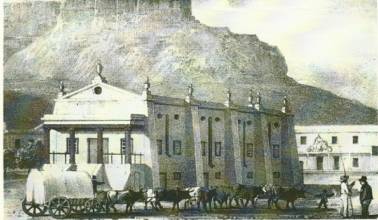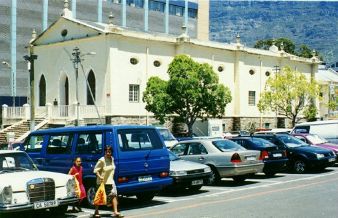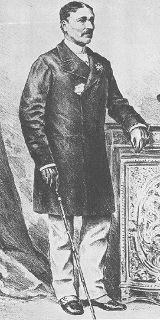Shakespeare in South Africa: The Nineteenth Century
Shakespeare in South Africa -- page 2
The nineteenth century
The African Theatre and after
Shakespeare in South Africa starts in speculation. Could it be that the famous performances of Hamlet and Richard II, which took place off the west coast of Africa in 1607, were repeated in Table Bay when the British East India Company's third voyage under Captain William Keeling reached Cape Town (see Racster 1, 205)? Possibly, but there is no evidence. Was Hamlet played by members of the garrison towards the end of 1799 at the newly constructed redoubt of Fort Frederick above the Baakens River in Algoa Bay, now Port Elizabeth? The evidence, a hand-drawn and dated handbill discovered during the restoration of Lodge Caledonia in Port Elizabeth during the mid- 1960s, is missing.
What we do know is that the African Theatre, whose structure still stands in what is now Riebeeck Square, Cape Town, opened to a performance of Henry 4 Part 1 in September 1801, a ritual - perhaps imperial - gesture described in a pre-performance notice as "the customary honor paid to our Immortal Bard" (Cape Town Gazette, November 15, 1800). The African Theatre grew out of a tradition of soldierly theatrical performance inaugurated by the Dutch in the early 1700s at the Castle barracks, continued by the French in the Hospital barracks, and further developed by the British after their takeover at the Cape in 1795. Sir George Yonge, governor of the Cape in succession to Lord Macartney, was so inspired by a performance at the Military Hospital of Samuel Foote's Taste (1752) put on by Dr Edmund Somers, director of the hospital, that he leapt to the determination that the Colony should have a theatre of its own (see Wright 2002).
The choice of Henry 1V Part 1 for the opening represents a climax of the soldierly theatrical tradition at the Cape, even though the military were in primarily responsible for the spread of theatre throughout the Colony; for from this moment theatre in Cape Town starts to achieve the social cachet and presence only briefly attained earlier by the French with performances of De Beaumarchais' The Barber of Seville and The Marriage of Figaro in the 1780s (Fletcher 18-20). Lady Anne Barnard, author of the ballad "Auld Robin Gray" and wife of the very competent Secretary to the Colony Sir Andrew, left a fairly substantial description of the opening night in a letter to Lord Macartney of 16 October 1801. [Note 1]
Following this trenchant, ideologically charged debut, Shakespeare played only a modest part in the early life of South African theatre. The fortunes of theatre fluctuated with the political vicissitudes of the Colony, dependant on changing talents and variable support from authority. The stage was shared, not always amicably, with Dutch, French and German amateur companies between 1800-1808, performing in their own languages and sometimes sharing actors. They were generally less linguistically chauvinist than the English, who stuck rigidly to their native tongue. For instance, a Dutch amateur company, "Tot Nut en Vermaak," staged The Merchant of Venice on 5 July 1817. Comedies and farces predominated, and Shakespeare was not prominent in the repertory. In 1918 "Tot Nut en Vermaak" acquired its own theatre, known as The Amateur Theatre, and the shares of the African Theatre fell into exclusively English hands.
In this early period there were a variety of incursions from the metropolis, some of which boosted the presence of Shakespeare. In 1829, a professional actor from the Theatre Royal, Liverpool, one H. Booth, stopped at the Cape on his way to New South Wales and became involved in Cape Town theatre for a period of three years. Shakespeare, including Othello, Romeo and Juliet, and Richard III, was part of the varied repertoire of his "English Amateur Company." He presented extracts from Othello on a number of occasions, the full play on 9 December 1829, and again on 3 March 1832 (Laidler 32). Booth's farewell to Cape Town - he returned to England and never did make it to New South Wales - was a performance of The Merchant of Venice in which he played Shylock with the English company "All the World's a Stage."
Shakespeare did, however, contribute inadvertently to the demise of the African Theatre. During the early 1830s there was a build-up of puritan intolerance in the Colony, emanating initially from the Dutch press and finding a receptive ear in religious circles, largely Methodist. One "Philemon," writing in the Commercial Advertiser (16 June 1836) following a performance by a Dutch company, complained:
In frequenting the Theatre, do not professing Christians pointedly violate their baptismal vows? . . . In listening to . . . Othello, do they not unnecessarily contract a horrible familiarity with passions and deeds of the most fiendish character . . . and give up their minds to be polluted by language so gross? Is not the guilt of such persons great, and their danger imminent?
Attitudes of the kind led to the eventual liquidation of the African Theatre in 1838, when it was converted - appropriately enough, given the circumstances - into a church.
Sefton Parry
After this, theatre in Cape Town sputtered on in a variety of venues, accompanied by much squabbling, financial upheaval, and several disastrous fires. The military continued to be active: September 8th 1847 saw the garrison performing The Merchant of Venice in the Barracks Theatre. Two rival outfits, the "Private Amateur Company" and "All the World's a Stage," occasionally ran Shakespeare, as later did the company of James Lycett, who landed with his family at the Cape in 1848 and was the leading figure in amateur Cape theatre until the arrival of the actor manager Sefton Parry in 1857. Lycett established his name in Cape Town theatre with a full-length Richard III, presented in Haupt's wine store, 21 Hope Street, in 1849. The female characters were played by women, apart from the Duchess of York, who was portrayed by a Mr Charles Spolander, "a butcher of Buitengracht Street" whose "soft voice . . . was just suited to that pathetic character" (Racster 23). (Curiously, Lycett was accidentally wounded on stage in 1858 while playing Macduff to Sefton Parry's Macbeth - the "scottish Play" strikes again!) Parry played a major role in the establishment of professional theatre in South Africa.
Throughout this early period, Shakespeare's weight was usually leavened by lighter offerings as, for instance, at the debut of a youthful company "The City Amateur Theatrical Society," which played to a full house in the Bree Street theatre, Cape Town, on 26 July 1854: the third act of Hamlet was followed by the farce A Race for Dinner (Rodwell), a burletta The Secret (Morris), and the burlesque Ion (Talfourd) (see Bosman 426-27). This was typical of the ethos of the time.
The Australian gold rush occasioned a fleeting visit from Gustavus (G. V.) Brooke, the "great tragedian" -- a term meaning roughly a notable "star" in the mid-Victorian acting tradition of Macready, whose established public reputation (accurate or not) lent him the trappings of gentility. Brooke was en route to Melbourne in the company of the young Fanny Cathcart, late of the Liverpool Theatre Royal. While their ship re-victualled, they put on a series of performances including Romeo and Juliet and Othello, assisted by the garrison in the minor parts. Other presentations were The Iron Chest, The Lady of Lyons and Box and Cox. Brooke and Cathcart went on to make important contributions in Australian theatre (see Love 2000). They were also, according to Racster (41), instrumental in persuading the young Sefton Parry and his wife, returning to England from successful touring in Australia, to stay on at the Cape. One of Parry's actors, JEH English of the Royal Theatre, Sheffield, and described as a "low comedian and singer" (Attwell 4), later teamed up with an experienced Shakespeareean actor, Charles Fraser, to present Othello, The Merchant of Venice and The Corsican Brothers.
Meanwhile the military had scattered English and German theatre into the hinterland: Theatre made its appearance in Grahamstown in 1848; in Port Elizabeth (the third performance of the Port Elizabeth Theatrical Amateurs comprised selections from Henry IV played at the wood and iron Lyceum in October 1853); Pietermaritzburg 1846; King William's Town 1854 (Macbeth together with a farce, Camp at Chobham, were produced there by the garrison in 1860). The ambiance was not always propitious. A writer in the Cape Argus (4 Sept 1862) noted, In Grahamstown seven out of ten people would be pronounced irredeemable were they seen listening to a Shakespearean drama (94).
Captain Disney Roebuck
One of the more memorable Shakespearean performances by Roebuck's company was a presentation of Othello at the "Kimberley Theatre Royal" (a large corrugated iron construction) in which the "kopje-walloper" [Note 2] and up-and-coming diamond magnate, Barney Barnato, promised to double the house "take" if he could play Iago. Hearing sniggers from the audience, at one point he broke off, leapt from the stage, and "delivered a resounding slap to the offender" - one Benny Hart, a fellow member of the Amateur Dramatic Society - before returning to his speech (Lewinsohn 85).
Roebuck brought out a new company from Britain almost every year. When he was away recruiting in Britain his deputy, a Mr Page, would engage actors pausing en route to Australia. The potential symbiosis between Australian and South African theatre was openly acknowledged. Already in 1871, a litany of complaint about the state of Cape theatre published in the Standard and Mail (25 October) had observed, "It is well known that London 'stars' are constantly accepting temporary engagements in Australia; if they started a month earlier than the date of their Australian contracts required, and made a month's stay at this place en route, they would do more than clear the expenses of their voyage, and keep up our dramatic taste to a good standard." Some of the consequent interchange has been sketched in Gray (1998).
In 1882 the Jamaican tragedian Morton Tavares, also well known in Australia, attempted a Shakespearean season in Natal with Hamlet and Macbeth. Writing in 1955, Stopworth comments with the typical earnestness of the period: "The experiment only proved that colonial audiences were not yet educated to the appreciation of serious drama; they wanted good singing, and plenty of fun . . .. Tavares was especially mortified to note that the curtain-raiser, Little Toddlekins [Matthew], was far better received than the tragedies of Shakespeare" (98). Apparently William Montague, playing Hamlet three years earlier in Pietermaritzburg, ran into similar difficulties: "the only scene which provoked any demonstration from the lifeless audience being the graveyard scene when a pumpkin was brought on to represent Yorick's skull" (Stopforth 98-99).
Luscombe Searelle and the fin de siècle
The stars came to South Africa in numbers after the opening up of the Gold Fields on the Witwatersrand in 1886, which gave rise to the city of Johannesburg. In the rapid five-year transition from raucous mining camp to thrusting commercial hub, this was a period when for the well-to-do "life was a gay and brightly-coloured bubble" (Knox: 32): gold-fever meets fin de siècle. A directory from the early 90s names well over 200 public bars in Johannesburg! The Americans Ben Wheeler and his son, Frank, who had toured Australia and India with a variety act before arriving in Natal in the 80s, were instrumental in bringing many English touring companies to South Africa. Among their imports was Luscombe Searelle (real name probably Isaac Israel, see Smith 1958) - an energetic and versatile operatic producer who had been attracted to South Africa from a successful stay in Australia where he had been conducting his own operas to celebrate Queen Victoria's jubilee. [Note 3]
Oddly, it was opera that boosted the claims of serious theatre in Johannesburg. Searelle hauled the wood-and-iron sections of what became Johannesburg's Theatre Royal from Durban to the Highveld, taking "an entire company of temperamental operatic singers, scenery, costumes and the theatre building itself" (Leyds 225) by train from Natal to the railhead at Ladysmith and thence by coach and wagon to Johannesburg. The "Opera House" was assembled on the corner of Commissioner and Eloff streets, down from the Globe Theatre (Johannesburg's first real theatre, newly opened on the 29 September 1888) [Note 4] in what was to become Johannesburg's theatre land. Searelle managed the Theatre Royal for the Wheelers.
While he was treating Cape Town to the standard repertoire of Italian grand opera, not forgetting his own comic opera Bobadil, Searelle brought to South Africa one of England's great Shakespearean actresses, Geneviève Ward, a former opera singer, originally American, who had turned to acting following the loss of her singing voice. In 1891, she arrived in Johannesburg, which she described as having "no pavements of any kind, yet the streets lighted by electricity, and the place but five years old" (Racster 75). With tireless stamina (she was 54), in a stay of eleven weeks Ward produced 16 plays, among them six of Shakespeare's (Macbeth, Othello, Hamlet, The Merry Wives of Windsor, The Merchant of Venice, and Much Ado About Nothing). This was Shakespeare's debut on the Reef.
Searelle also scored palpable Shakespearean hits in Hamlet and Romeo and Juliet with the partnership of Cora Urquhart Brown-Potter and the romantic lead Kyrle Bellew (both well-known in Australia), whom he brought out in 1892. Their company's run was cut short when the Exhibition Theatre in Cape Town burned to the ground, and shortly thereafter the two stars returned to England (Fletcher 118).
This was also the period of grand theatre building in Johannesburg. The Standard opened in 1891, The Gaiety in 1893, and the old Globe theatre was remodeled to become "The Empire Palace of Varieties" in 1894. Set against the avalanche of theatrical production that ensued, it appears that Shakespeare has little claim to special prominence.
According to Hoffman, Lillian Beddard's was "the first Shakesperian company to perform in Johannesburg"(19). Romeo and Juliet ran at the Theatre Royal from 3-8 June, 1889, with Lillian Beddard as Juliet. To give some idea of the theatrical company Shakespeare was keeping at the time, we see that from 10-14 June 1889 Beddard was playing Clara Douglas in Bulwer Lytton's comedy, Money. From 21-26 June she was Lady Mary in J.W. Boulding's The White Queen - a play written specially for her. From 1-3 July, she played Leslie Brudenell in Pinero's The Profligate. Then came her role as Lady Macbeth in the second Shakespeare offering, which ran from 8-13 July.
Notes
[1] The passage has some claim to being the first piece of South African dramatic criticism, and reads in part:
It opened with an address to Apollo, spoken by Dr. Somers, & wrote by Mrs. Somers. It was too fine for anyone to understand it, & seem'd rather an index of pretty learning than any conversation which Apollo could have liked to listen to - however the scene was good, & all was new. The piece was a dull one, the first part of Henry the 4th. The doctor thought that he shone in Falstaff, we did not agree with him. Do you remember the soliloquy upon Honour? [1 Henry 1V, 5.1.] It was not a bad stricture on some people present, had they felt it so. "What is honour? A word. Who hath it? The man that died on Wednesday. Doth he feel it? No. Doth he hear it? No. Is it insensible then? Yea, to the dead. But will it not live with the living? No. Why? Detraction will not suffer it." Do you not think I had some virtue for not loudly clapping, & looking certain people in the face?
(Fairbridge 1924: 289-90)
Lady Anne clearly saw the play as a teasing stricture on those who had gone along with the lax regime of Sir George Yonge, in contrast to the probity characteristic of Lord Macartney's former tenure, and notably exemplified in the person of her husband, Sir Andrew. Contrasts between accepted colonial discipline and the regimen of Falstaff may well have resounded richly for those who had attempted to control the errant governor, who was recalled to England prior to the theatre's opening. [Back]
[2] "A diamond-buyer who bought stones directly from diggers on their claims . . ." (DSAEhist). [Back]
[3] Luscombe Searelle's Tales of the Transvaal [1896?] offers ample evidence of his sensibility: bluff, habitual racism (witness his chapter 8, "A General Dissertation on Kaffirs" and his comments on "Niggers" in Queensland, Australia) and anti-semitism, matched by robust enthusiasm, parading of exotic "local knowledge" and perennial swagger. Colonial arrogance is so ingrained as to be apparently unconscious. [Back]
[4] The fin de siècle aspirations of the Globe Theatre are apparent in this contemporary description:
"'This new Thespian temple is one of which Johannesburg may well have reason to be proud,' rhapsodizes one writer of the early nineties. 'The theatre has been very handsomely furnished, the stalls being made of dark blue leather, being upholstered in Royal blue velvet plush and pale blue silk, with gold trimmings - - the architects have not merely contented themselves with giving the patrons of the circle an uninterrupted view of the performance, but have studied their comfort in every possible manner, so much so that it is no exaggeration to say that the Circle will be the most popular portion of the theatre. For the ladies an elegant 'foyer' has been arranged, the upholstery being in red plush, and adjoining this is an excellently appointed lavatory. On the other side is a pretty little promenade, and the men will be able to enjoy a cigarette and a glass of water between the acts."
(Knox: 41-42)
The "glass of water" is a nice touch! [Back]



